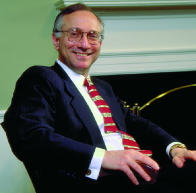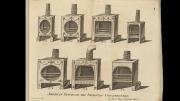University provost Harvey V. Fineberg, once a leading candidate for Harvard's presidency, has announced his intention to resign his position July 1. The news, which came just 10 days after Lawrence H. Summers was named Harvard's twenty-seventh president, shifts gears in a career devoted to the University. Fineberg--A.B. '67, M.D. '71--went on to earn an M.P.P. from the Kennedy School of Government in 1972 and, in 1980, a Ph.D. from the Graduate School of Arts and Sciences. This was followed by tenure at the School of Public Health, its deanship in 1983, and finally the provost's office in 1997.
In that position, Fineberg has overseen unprecedented levels of cooperation and coordination across the University's highly independent schools in several areas, ranging from student health to campus planning and information technology. He has also strengthened the University's interfaculty initiatives and was instrumental in the negotiations that integrated Radcliffe College into Harvard as a new institute for advanced study. And he inherited ADAPT, a massive, and at times troubled, effort to modernize financial and human resources systems across the institution.
 |
| Departing provost Harvey V. Fineberg |
| Photograph by Jim Harrison |
Fineberg was the first sitting provost ever considered for Harvard's top job, and his high visibility on campus made his resignation poignant. In a letter to the Harvard community, Fineberg wrote of the provost's "close working relationship with the President" and declared, "I believe that our new President-elect deserves the opportunity and the fullest flexibility to design this important role and relationship in the way he sees fit, from the earliest stages of his tenure." President Neil L. Rudenstine praised Fineberg's work as provost and said he had also been a close colleague and friend. "He has, above all, brought a thoughtful and humane presence to all the affairs of the University," Rudenstine added. "Those qualities, together with his strong capacity for analysis and judgment, have made him literally invaluable to me and to the University."
Fineberg said he intends to make himself fully available to the president-elect to aid in the transition. "It is clear that Harvey Fineberg has been an outstanding provost..." said Summers. "I look forward to benefiting from his counsel, and will begin consulting soon in regard to future provostial possibilities."
Fineberg, who remains professor of health policy and management, said that a sabbatical beginning July 1 will allow him to refocus on his academic work and to consider his long-term plans.





